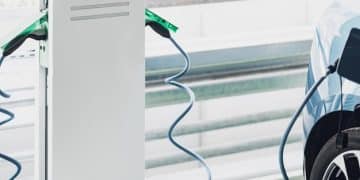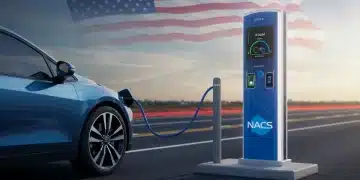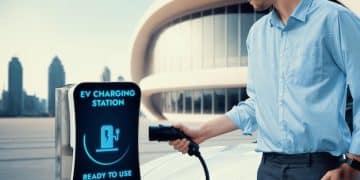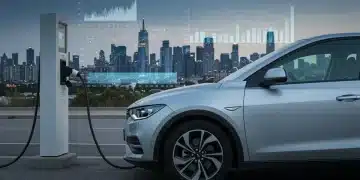Electric Vehicle Charging Standard Update: Universal Standard by 2025
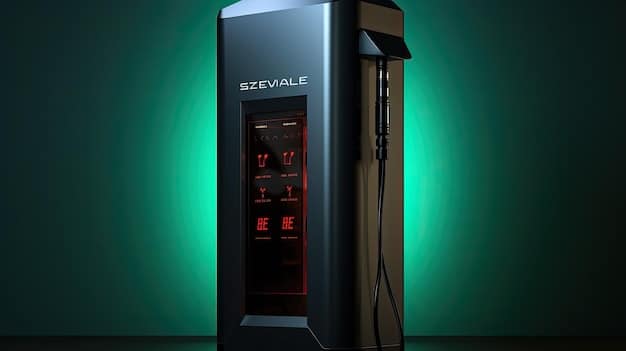
Industry leaders have reached an agreement to implement a new universal charging standard for all electric vehicles by 2025, aiming to streamline the charging experience and promote wider EV adoption across the United States.
The automotive industry is on the cusp of a significant transformation with the Electric Vehicle Charging Standard Update: Industry Leaders Agree on New Universal Charging Standard for All Electric Vehicles by 2025. This groundbreaking agreement promises to streamline the charging process for electric vehicles, making them more accessible and convenient for consumers across the United States.
Electric vehicle charging standard update: the need for a universal standard
The proliferation of electric vehicles (EVs) has brought about a pressing need for standardized charging infrastructure. Currently, EV owners face a fragmented landscape with various charging connectors and protocols, leading to confusion and inconvenience.
This lack of uniformity hinders the widespread adoption of EVs. Establishing a universal charging standard is essential to simplify the charging experience, boost consumer confidence, and accelerate the transition to electric mobility.
Challenges with current charging standards
The current EV charging landscape is characterized by a mix of standards, including CHAdeMO, CCS (Combined Charging System), and Tesla’s proprietary connector. This fragmentation presents several challenges:
- Incompatibility: EV owners may encounter charging stations that are incompatible with their vehicle’s charging port, limiting their charging options.
- Confusion: The variety of charging standards can be confusing for consumers, especially those new to EVs.
- Infrastructure costs: Maintaining multiple charging standards increases infrastructure costs for charging station operators.
Addressing these challenges requires a collaborative effort from automakers, charging network providers, and regulatory bodies to establish a universal charging standard that benefits all stakeholders.
Ultimately, a universal standard will not only make EV ownership more convenient but also pave the way for a more efficient and reliable charging infrastructure.
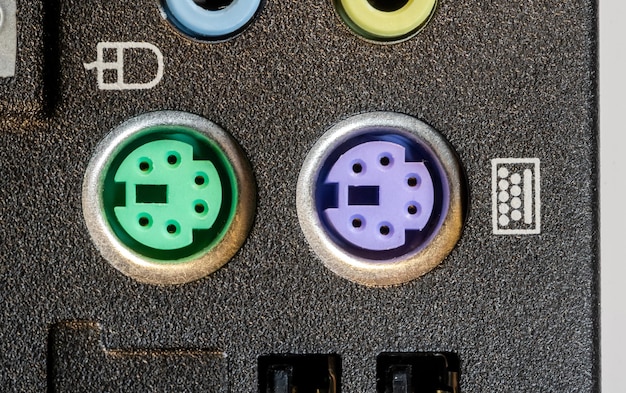
Industry leaders unite for a common goal
In a landmark move, leading automakers, charging network operators, and technology providers have come together to forge a consensus on a universal charging standard for electric vehicles. This collaborative effort signifies a shared commitment to advancing EV adoption and creating a seamless charging ecosystem.
The agreement is the culmination of extensive discussions and negotiations among key industry players, driven by the recognition that standardization is crucial for the long-term success of the EV market.
Key players involved in the agreement
The coalition behind the universal charging standard includes prominent names in the automotive and energy sectors:
- Automakers: Major automakers such as General Motors, Ford, and Tesla have pledged their support for the new standard.
- Charging networks: Leading charging network providers like Electrify America, ChargePoint, and EVgo are committed to deploying charging stations that adhere to the universal standard.
- Technology providers: Technology companies specializing in EV charging solutions are actively involved in developing and implementing the new standard.
The collaboration between these diverse stakeholders underscores the industry’s collective resolve to overcome the challenges associated with charging incompatibility and accelerate the transition to electric mobility.
This unified front ensures that the universal charging standard is robust, scalable, and aligned with the evolving needs of the EV market.

The new universal charging standard: details and benefits
The new universal charging standard is based on the Combined Charging System (CCS) connector, which supports both AC and DC fast charging. This standard will be enhanced with advanced features and capabilities to ensure interoperability, safety, and efficiency.
The goal is to create a unified charging experience for all EV owners, regardless of vehicle make or charging network.
Technical specifications of the standard
The universal charging standard encompasses several key technical specifications:
- Connector type: The CCS connector will be the standard charging port for all EVs.
- Charging speeds: The standard will support a wide range of charging speeds, from Level 2 AC charging to ultra-fast DC charging.
- Communication protocols: Standardized communication protocols will enable seamless communication between EVs and charging stations.
These specifications are designed to ensure that EVs can charge safely and efficiently at any compatible charging station.
Standardizing the connector type and communication protocols will greatly simplify the charging process for EV owners.
Impact on existing charging infrastructure
The implementation of the universal charging standard will have a significant impact on existing charging infrastructure. Charging network operators will need to upgrade or retrofit their stations to support the new standard, while automakers will need to equip their vehicles with compatible charging ports.
This transition will require substantial investment and coordination across the industry.
Retrofitting existing charging stations
Charging network operators will face the challenge of retrofitting their existing charging stations to support the universal standard. This may involve:
- Upgrading connectors: Replacing existing connectors with CCS connectors.
- Software updates: Updating charging station software to support standardized communication protocols.
- Power upgrades: Increasing the power capacity of charging stations to support faster charging speeds.
While retrofitting existing charging stations will require investment, it is essential to ensure that EV owners have access to a comprehensive and interoperable charging network.
This investment will pave the way for a more reliable and user-friendly charging experience.
Consumer benefits and market implications
The universal charging standard is expected to bring numerous benefits to consumers, including greater convenience, lower charging costs, and increased access to charging infrastructure. These benefits are poised to drive EV adoption and reshape the automotive market.
By simplifying the charging experience, the universal standard will address a major barrier to EV ownership.
Increased convenience and accessibility
With a universal charging standard, EV owners will no longer have to worry about compatibility issues when charging their vehicles. This will:
- Simplify route planning: EV owners can plan their routes with confidence, knowing that they can charge their vehicles at any compatible charging station.
- Reduce range anxiety: The availability of a standardized charging network will alleviate range anxiety, making long-distance travel more feasible for EV owners.
- Enhance the charging experience: A unified charging experience will make EV ownership more seamless and enjoyable.
These improvements will enhance the appeal of EVs and encourage more consumers to make the switch from gasoline-powered vehicles.
The enhanced charging experience will contribute to greater customer satisfaction and loyalty.
Challenges and future outlook
While the universal charging standard represents a major step forward for the EV industry, several challenges remain. These include ensuring interoperability across different charging networks, addressing cybersecurity concerns, and keeping pace with evolving charging technologies.
Overcoming these challenges will require ongoing collaboration and innovation.
Ensuring interoperability across networks
To ensure a seamless charging experience for EV owners, it is crucial to ensure interoperability across different charging networks. This will require:
- Standardized communication protocols: Implementing standardized communication protocols that enable EVs to communicate with charging stations from any network.
- Roaming agreements: Establishing roaming agreements between charging networks to allow EV owners to charge their vehicles on different networks without needing multiple accounts.
- Open standards: Adopting open standards to promote innovation and competition in the EV charging market.
These measures will ensure that EV owners can charge their vehicles seamlessly, regardless of the charging network they use.
This interoperability will be essential for fostering a vibrant and competitive EV charging market.
| Key Point | Brief Description |
|---|---|
| ⚡ Universal Standard | Industry agrees on a single charging standard for EVs by 2025. |
| 🤝 Key Players Unite | Automakers, networks, and tech providers collaborate on the new CCS-based standard. |
| 💰 Infrastructure Impact | Existing stations need retrofitting, while new EVs get CCS ports. |
| ✅ Consumer Benefits | Enhances convenience, lowers costs, and increases EV-charging access. |
[FAQ]
Frequently Asked Questions
▼
The universal charging standard is based on the Combined Charging System (CCS) connector, supporting both AC and DC fast charging for all electric vehicles.
▼
The universal charging standard is slated for implementation by 2025, with industry leaders agreeing to adopt it for all new electric vehicles.
▼
Benefits include increased convenience, reduced charging costs, and greater access to charging infrastructure, promoting the wider adoption of EVs across the US.
▼
Existing charging stations will need to be upgraded or retrofitted to support the new universal standard, ensuring compatibility with all electric vehicles.
▼
Key players include major automakers, charging network operators, and technology providers collaborating to establish and deploy the universal charging standard.
Conclusion
The adoption of a universal charging standard for electric vehicles by 2025 marks a pivotal moment for the EV industry. This collaborative effort promises to streamline the charging experience, boost consumer confidence, and accelerate the transition to electric mobility across the United States, setting the stage for a cleaner, more sustainable transportation future.
